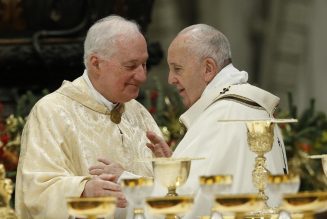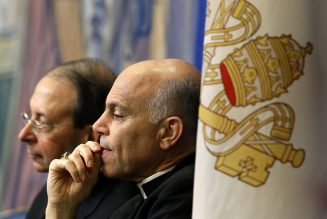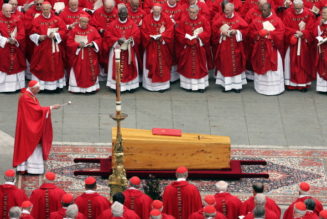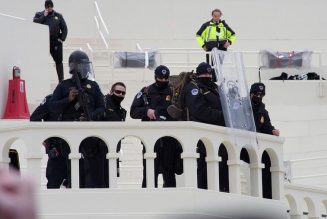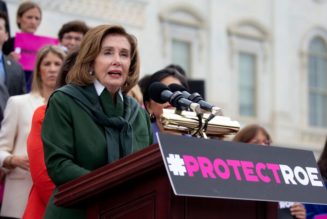
U.K. voters have rejected its messiah and his message.
During the United Kingdom’s recent general election, the subject of religion was not mentioned. Unlike in the United States, religion has rarely been a vote-winner in British politics, particularly during elections. This election proved different, however.
Although not recognized as such by the media, there was a religious sect taking part in the 2019 British general election. Perhaps one might call it the Church of Corbyn (CoC).
Recently founded, this “church” comprised members who swore blind obedience to the thinking and personality of Jeremy Corbyn, who also — for the moment — happens to be the leader of the U.K.’s Labour party. Corbyn’s unexpected crowning as Labour’s leader came after decades in the political wilderness. In those days, far from the then-centers of power within his party, Corbyn was a lonely voice crying in a wilderness of his own making, calling to anyone who would listen to the one thing that would save not only the Labour party but the whole of society and, indeed, the world: namely, socialism.
But no one listened. He was politely ignored, or viewed as an eccentric. During the Blair era, when electoral success came easy to the Labour party, Corbyn decried the party’s betrayal of its socialist ideals. Flushed by electoral success, those whom he lectured saw him as an embarrassment, a relic of another age.
By the 21st century, Corbyn should have quietly disappeared. That was the expectation. He was to retire to his allotment and grow organic vegetables, there to sit and lament the hijacking of the pure socialist ideals of the Labour party by neo-liberals. Instead, in 2015, following another Labour defeat at the ballot box, he was proposed as a candidate for the party’s leadership. There was, on one level, nothing unusual about this. What is known as “the Left” of the Labour party had always run a candidate from that wing of the party, but with the expectation from the party as a whole that such a candidacy was hopeless. Normally, this expectation was right, not least because, up until then, the leadership contest was decided by balloting Labour’s Members of Parliament, who were as pragmatic as some were ambitious, and traditionally more to the right than the wider party membership throughout the country.
In 2015, the leadership contest was different, though. Voting was opened up to the whole of the Labour party — to Labour MPs and the party’s rank-and-file membership. That membership had recently swelled because of a new and significantly discounted rate — a mere £3 fee — to join the party before the leadership contest. Many of the new members, who were suspected to have come from other extreme left-wing groupings, determined once and for all to move the Labour party and its leadership in a Marxist direction. Thus was elected the most unlikely leader the Labour party has ever had: Jeremy Corbyn.
This event sent shock waves through the party. But, as in all the best revolutions — at least as those leading them would have us believe — the forces of reaction stepped in to try to snuff out these embryonic flames of revolutionary fervor. So it was with Corbyn’s election as leader, and with what quickly became known as “Corbynism.” The party elite, mainly its elected Members of Parliament, tried to oust Corbyn when he was barely a year into the job. They failed in their attempt and, in so doing, made the target of their failed coup stronger and also more determined to carry through his mission.
And so gradually was born the Church of Corbyn. Its members would talk of “Jeremy” as if he were an oracle, a prophet, a messianic figure — a long-awaited real politician — in whom people could at last believe.
A general election was called in 2017. It was an election dominated by one issue: Brexit. With a 20-point lead in the opinion polls, the prime minister, Theresa May, began her campaign to achieve an even greater parliamentary majority than the one she already possessed. It was a fair gamble. No one, either in the media or in the Conservative party, took Corbyn and his party seriously. Of course, we know now that the final result was as unexpected as it was welcome to those in the CoC, confirming all they believed in — namely, that Jeremy was indeed a messiah. He was the one who would be able at last to convince the British electorate of the benefits of socialism and reveal to them how, for centuries, they had been the unconscious dupes of international capitalism. As the 2017 election results came through, the complacent smiles were wiped off the faces of Corbyn’s opponents, to be replaced by broad smiles all round at the CoC.
What is more, the true believers of the CoC knew that if the 2017 election campaign had been run just one week longer, then Jeremy would have been handed the keys to No. 10 Downing Street. Their day would come, however, they told themselves; for now, at least their leader was unassailable within the Labour party and, what is more, taken seriously at last by his political opponents and the media.
The 2019 election was to prove yet another gamble. With the country divided — evenly — by Brexit, and with Jeremy at the head of the Labour party bearing a message of “national healing,” there was an expectation that 2017’s result could be equaled, or better still that the vote would result in a Labour majority. As the election campaign got underway, however, the Tories took nothing for granted this time. Instead, they fought as keenly on this occasion as they had been complacent in 2017, as no one was under any illusion: There was a real possibility of Corbyn being elected prime minister with the most left-wing manifesto in a generation.
The ensuing result was spectacular. Corbynism was seen off, well and truly, by Boris Johnson. It was rejected not just by marginal constituencies but even by great swathes of Labour’s traditional heartlands in the north and midlands of England.
As the scale of the defeat became known, however, the CoC began to construct another narrative: Clearly, the devastating election result was all “Brexit’s fault.” They had a point, of course, but it was far from the whole truth. CoC adherents told themselves that Jeremy and his manifesto and its irresistible charms had been drowned out by Brexit, and that this had occurred with the connivance of the “media” — which is shorthand for any media outlet not fully signed up to the CoC worldview.
In the theology of the CoC there are three divisions of the human race: victims, villains, and saviors. The saviors are, of course, socialists, with Jeremy as a kind of pontifex maximus. The victims are all those who have been “oppressed by the forces of imperialism” and all the other “isms” that the CoC can muster. The identification as victims is especially vital to communicate to those who do not feel oppressed — even when the CoC knows definitively that they are. The villains are the agents of capitalism, principally the international networks of bankers and others who, like pantomime figures, awake each morning with a sole objective: to oppress and exploit as many people as they can until they retire to dinner, where they toast the success of their misdeeds. To free the victims from these villains, the victims need saviors, and that is where their socialist friends enter and set the world to rights.
It was a straightforward narrative that ran through all the pronouncements of the CoC during the election campaign. It was, and still is, the standard narrative of every left-wing group since Karl Marx borrowed money from friends so as to drink between writing bouts at the British Library. Yet, when in 2019 the CoC built this narrative into and around the manifesto and campaign of the Labour party, the British electorate wholly rejected it.
The Left knew immediately, following the election results, that their analysis of the campaign’s failure was correct: It was all a plot — one concocted with foreign backing, supported by reactionary media. It was these forces that had frustrated the message of Jeremy, preventing it from reaching the ears of all those victims the length and breadth of the United Kingdom who needed to hear it. That was the true reason why Jeremy was not now sharing No. 10 with a homeless family.
The real reason was more prosaic, however. The British electorate is no fool, but they recognize one when he appears. The vast majority of the British electorate did not feel oppressed, and they did not need a savior who came promising a “socialist paradise.” Rather, they are people living quiet lives with their families, and whose main concern is making ends meet, getting by. These people are good neighbors and reliable workers who have a passing interest in politics but, other than voting when asked to do so, have better things to be getting on with. So they get by; they make do; they know that life is not perfect but, nevertheless, have ambitions for themselves and their children.
The CoC, however, does not recognize such people. These ordinary people do not fit the critique of capitalism that the CoC knows. The CoC also knows that these people believe all the lies they have been told; otherwise they too would welcome the “gospel of Corbynism.” Those unfortunately outside the CoC do not realize, so the story goes, that their lives are built on lies and deceit; they do not understand just how oppressed — and in turn oppressive — they are. But for the CoC, the British electorate’s greatest crime is the one committed on December 12, 2019: namely, not voting for the savior in their midst and, instead, putting into office the living, breathing embodiment of an Anti-Jeremy.

